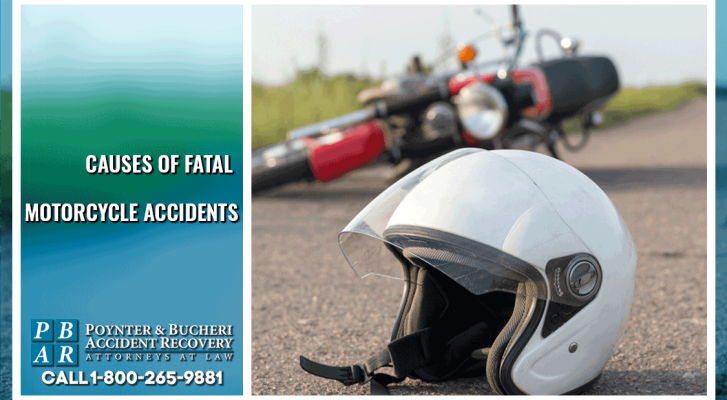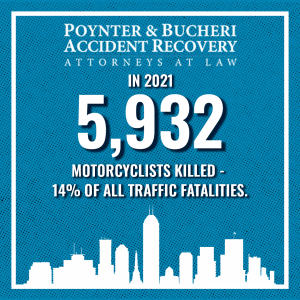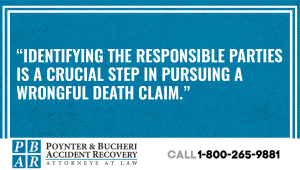
Fatal Motorcycle Accidents and Wrongful Death Claims

Motorcycle accidents are a devastating and all too common occurrence on Indiana roads. With the thrill and freedom that comes with riding a motorcycle, there are also inherent risks. Unfortunately, these risks can sometimes result in fatal accidents, leaving families and loved ones grieving and grappling with the aftermath. In such cases, wrongful death claims may arise, seeking to hold those responsible for the accident accountable. In this blog, we will explore the tragic consequences of fatal motorcycle accidents and the legal options available through wrongful death claims.
Causes of Fatal Motorcycle Accidents

According to the National Highway Traffic Safety Administration (NHTSA), motorcyclists are 27 times more likely to die in a crash than occupants of passenger vehicles. Many factors can contribute to fatal motorcycle accidents, but injuries and deaths from motorcycle collisions are primarily from the following:
- Speeding: Speeding is a leading cause of fatal motorcycle accidents. Motorcyclists who speed are more likely to lose control of their bikes and crash.
- Distracted Driving: Distracted driving is another common cause of motorcycle accidents. Drivers who are distracted by their phones, food, or other passengers may not see motorcycles on the road, leading to collisions.
- Alcohol and Drug Use: Operating a vehicle while under the influence of drugs or alcohol is dangerous and can result in fatal accidents.
- Lane Splitting: Lane splitting is when a motorcyclist drives between lanes of traffic. It can be dangerous and lead to collisions with other vehicles.
- Lack of Protective Gear: Motorcyclists who do not wear helmets, leather jackets, and other protective gear are more likely to suffer fatal injuries in an accident.
Determining Liability After a Fatal Motorcycle Accident

One critical aspect of dealing with a fatal motorcycle accident is determining who may be held liable for the accident. Identifying the responsible parties is a crucial step in pursuing a wrongful death claim. Liability in motorcycle accidents can be complex and may involve multiple parties including:
- Another driver
- Manufacturer of the motorcycle
- Mechanic
- Government entity
- Poor road conditions or inadequate road signage could result in a crash
Proving Fault After a Fatal Motorcycle Accident
To successfully bring a wrongful death claim, several elements must be proven, including:
- The defendant owed a duty of care to the deceased motorcyclist
- The defendant breached that duty of care through their actions or inactions
- The defendant’s breach of duty caused the motorcyclist’s death
- The plaintiff suffered damages as a result of the death, such as lost income, medical bills, and funeral expenses.
If your loved one was killed in a motorcycle accident that was due to someone else’s negligence, you need to contact a motorcycle crash lawyer to pursue a wrongful death claim.
What Is a Wrongful Death Claim?
Wrongful death claims are legal actions brought on behalf of the deceased victim by their surviving family members. These claims seek to hold the at-fault parties responsible for their actions or negligence that resulted in the fatal motorcycle accident. The laws surrounding wrongful death claims vary by state, and it is crucial to seek legal guidance from experienced personal injury lawyers who specialize in wrongful death cases.
In wrongful death claims, the burden of proof falls on the plaintiff, who must show that the death of their loved one was the result of the defendant’s negligence or wrongful act. This can be challenging, as evidence needs to be collected and preserved, witness testimonies need to be obtained, and legal arguments need to be made effectively. Having a skilled wrongful death attorney by your side can make a significant difference in the outcome of your claim.
Wrongful Death Compensation
Compensation for wrongful death claims can include economic and non-economic damages. These include:
Economic Damages: These are tangible losses that can be quantified, such as:
- Medical expenses incurred before the deceased’s death
- Funeral and burial expenses
- Loss of income or financial support from the deceased
- Loss of benefits, such as health insurance and retirement savings
- Property damage
Non-Economic Damages: These are intangible losses that are more difficult to quantify, such as:
- Pain and suffering experienced by the deceased before their death
- Loss of companionship, society, and guidance from the deceased
- Emotional distress suffered by surviving family members
It is important to note that there are strict time limits, known as statutes of limitations, for wrongful death settlements. These time limits vary by state and failure to file within the specified timeframe may result in the claim being barred. This is why it is crucial to seek legal representation promptly after a fatal motorcycle accident to ensure that your rights are protected.
Who Can File a Wrongful Death Claim?
Each state has its own laws regarding who is eligible to file a wrongful death claim. In Indiana, the following parties can file a claim:
If the decedent is a child:
- One or both parents
- The child’s legal guardian
If the decedent is an adult, only the personal representative or the executor of the deceased’s estate can file a wrongful death claim.
Contact Poynter & Bucheri for Expert Guidance for Your Wrongful Death Claim
The aftermath of a fatal motorcycle accident is a heart-wrenching experience for the victim’s family and friends. The physical, emotional, and financial toll of losing a loved one in such a sudden and traumatic manner can be overwhelming. Dealing with grief and loss is already a heavy burden, but families also face the additional challenges of medical bills, funeral expenses, loss of income, and future financial security.
During this difficult time, it is essential to understand the legal options available to seek justice for the wrongful death of a loved one. Contact the expert motorcycle accident and wrongful death attorneys at Poynter & Bucheri today. Call us at 1-800-265-9881 or contact us online for your free case review.
